Op-Ed: Why it takes local journalism to uncover national scandals like the Boeing 737 Max disaster

When the first Boeing 737 Max jet crashed in October 2018, two things stood out. This wasn’t an old, poorly maintained airplane but a brand new jet, just out of the factory. And the pilots weren’t facing a horrible storm; the weather in Indonesia that day was perfect.
Right away, long before a second 737 Max crashed four months later, Dominic Gates, the Seattle Times’ aviation reporter, knew to start digging.
The anguished families of 346 crash victims — and anyone who travels by air — needed the truth. Fortunately, Gates had been on the Boeing beat for 16 years. He had developed deep expertise and reliable sources through careful reporting. He had written about the business strategies, workforce concerns and all other aspects of the powerful worldwide manufacturer that got its start in Seattle.
He was well positioned to pursue what went wrong.
The story of how Gates and a team of Seattle Times reporters led the world with their coverage of the 737 Max crashes, winning the 2020 Pulitzer Prize for national reporting on Monday, underscores the unmatched value of independent local journalism.
Now more than ever, as local news staffs help their communities cope with the deadly COVID-19 pandemic, the importance of local reporting is on display. But now more than ever, it’s also in peril.
The pandemic and resulting stay-at-home orders have caused an economic crash with an unknown bottom. That has hit strapped news organizations so hard that many have made deep staff cuts, and some are closing for good.
In the case of the Boeing crashes, strong, locally based reporting has not only informed the public but has helped prompt congressional hearings, corporate housecleaning and demands for greater federal oversight of air safety.
Gates spent weeks after the first 737 Max crash interviewing engineers from Boeing and the Federal Aviation Administration who, speaking on background for fear of losing their jobs, described serious omissions in the certification of the jet’s flight control systems. He obtained hard evidence — internal proprietary documents — that confirmed what he’d heard: The plane’s automated flight controls had serious design flaws and Boeing had given the FAA incomplete information during the certification process. The federal regulator had ceded much of its oversight to the company, laying the groundwork for catastrophe.
When the Seattle Times published “Flawed analysis, failed oversight” on March 17, national media followed. By then we had already launched our yearlong, continuous investigation. A team of four reporters — with editors, graphic artists, photographers and others from around the newsroom — produced 150 articles ranging from breaking news to deeply reported investigations. Our reporting exposed how Boeing’s shifting culture and focus on short-term profits, enabled in part by lax regulators, led to the tragic accidents. The plane has now been grounded by the FAA for more than a year.
This type of reporting doesn’t materialize out of thin air.
Our coverage of this crisis followed decades of reporting on the inner workings of Boeing. Of 11 Pulitzers now won by the Seattle Times, three have recognized coverage of Boeing — and two of those focused on safety.
The Times has faced the same financial challenges that have hit newspapers throughout the country. But we’ve continued to maintain a full-time aviation beat reporter and have prioritized authoritative beat reporting throughout our newsroom. We’ve also sustained an investigative reporting team that often partners with colleagues in other departments.
Yes, we’ve had to cut our staff because of declining ad revenue. The newsroom is now about half what it was 20 years ago. But it still numbers 155, larger than many metro dailies we consider our peers.
The local Blethen family, now in its fourth and fifth generations of Seattle Times ownership, has made it possible for us to remain independent. Frank Blethen, our publisher, does not have to goose a corporate stock price or repay hedge-fund debt like too many newspaper owners. Instead, he and his family have sold valuable property and plowed that profit back into journalism.
Now, because of the coronavirus pandemic, the Blethens and news publishers everywhere face a new existential threat: an economic recession deep enough and potentially long-lasting enough to take them down.
It’s time for anyone who has sleepily ignored the news industry’s crisis to wake up. Subscribe. Donate. Lobby lawmakers to find a rescue plan that provides needed support without compromising the critical independence of news organizations.
As proud as we are of our new Pulitzer Prize, my colleagues and I don’t do this work for awards. We do it to inform readers, to keep powerful people honest, and in some cases — air travel and deadly pandemics included — to help save lives.
Michele Matassa Flores is executive editor of the Seattle Times.
More to Read
A cure for the common opinion
Get thought-provoking perspectives with our weekly newsletter.
You may occasionally receive promotional content from the Los Angeles Times.










